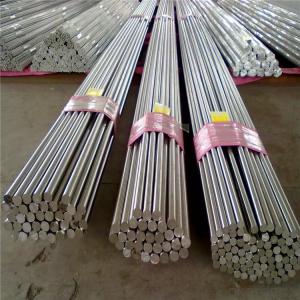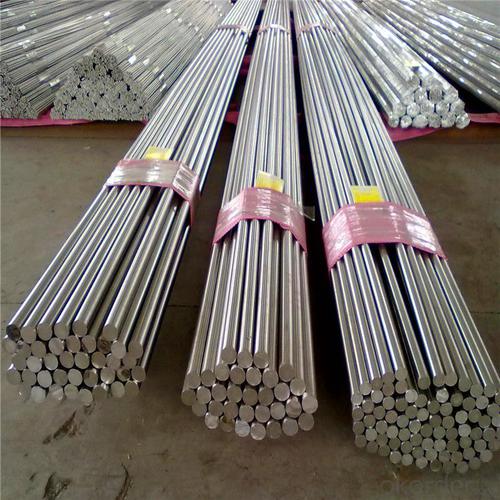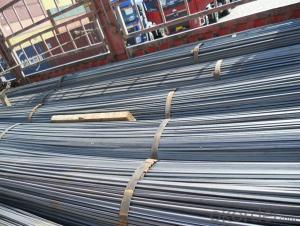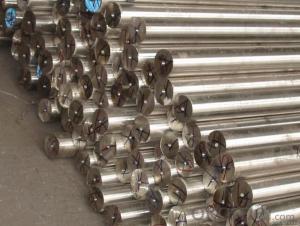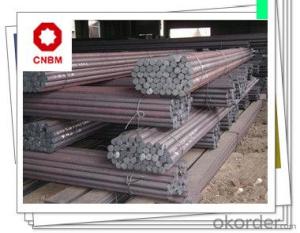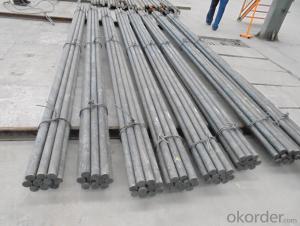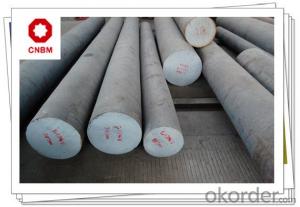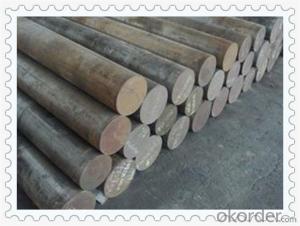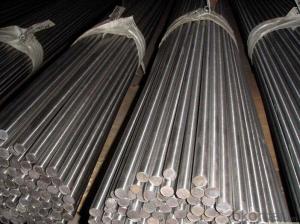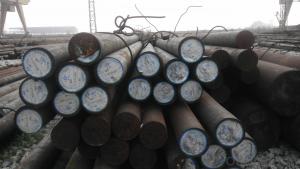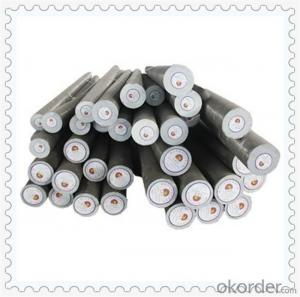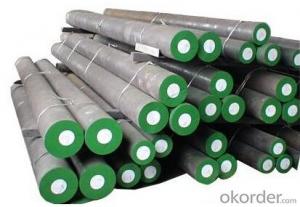JIS Hot Rolled Structural Steel Bar SCM440
- Loading Port:
- Tianjin
- Payment Terms:
- TT OR LC
- Min Order Qty:
- 100 m.t.
- Supply Capability:
- 50000 m.t./month
OKorder Service Pledge
OKorder Financial Service
You Might Also Like
Specification
JIS Hot Rolled Structural Steel Bar SCM440
Product Description of JIS Hot Rolled Structural Steel Bar SCM440
1. Steel grade: ASTM4140, SCM440, 42CrMo, DIN1.7225
2. Length: 6M-12M
3. Diameter: 16mm-300mm
4. Product range: round bar, flat bar, square bar
5. Technique: Hot rolled, forged, cold drawn
Specification of JIS Hot Rolled Structural Steel Bar SCM440
Material | SCM4140 | Round bar | Dia(mm) | 16-300mm |
Process | EAF + LF + VD + Forged + Heat Treatment (optional) | Length (mm) | Max 12m | |
Heat treatment | Normalized / Annealed / Quenched / tempered | Flat bar | Thickness(mm) | 8-500mm |
Delivery condition | Hot forged +Rough machined (black surface after Q/T)+ Turned (optional) | Width(mm) | 70-200mm | |
Test | Ultrasonic test according to SEP 1921-84 D/d | Length (mm) | Max 12m |
Chemical Composition of JIS Hot Rolled Structural Steel Bar SCM440
C | Si | Mn | Cr | Mo | P | S |
0.38~0.43 | 0.15~0.35 | 0.75~1.00 | 0.8~1.1 | 0.15~0.25 | ≤0.035 | <0.04< td=""> |
Photo Show of JIS Hot Rolled Structural Steel Bar SCM440
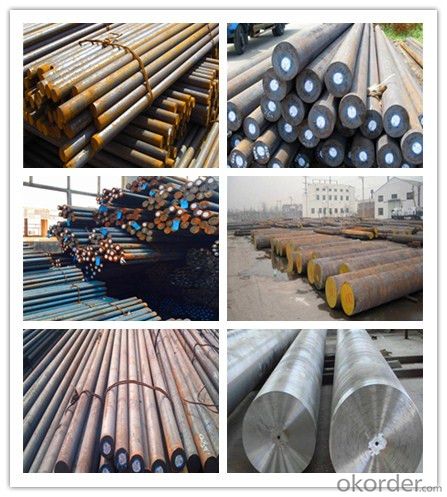
Packing and Delivery:
Packing in bundle package, or as customer's requirements.
Delivery Detail: 45 days after receiving the deposit.
Usage and Applications of JIS Hot Rolled Structural Steel Bar SCM440
1. Steel round bar is used in a large number of architectural and engineering structures. Or it can be used in construction of plants for the production of steel house frames, high-voltage transmission towers, bridges, vehicles, boilers, containers, ships, etc.
2. And we can use this kind of product on the performance of the mechanical parts if the demand is not very high.
3. Some special material steel round bar can be used for main shaft of steamer, hummer shank, with big section and supper force.
Company Information
CNBM International Corporation is the most important trading platform of CNBM group.
Whith its advantages, CNBM International are mainly concentrate on Cement, Glass, Iron and Steel, Ceramics industries and devotes herself for supplying high qulity series of refractories as well as technical consultancies and logistics solutions.


F A Q
1, Your advantages?
professional products inquiry, products knowledge train (for agents), smooth goods delivery, excellent customer solution proposale
2, Test & Certificate?
SGS test is available, customer inspection before shipping is welcome, third party inspection is no problem
3, Factory or Trading Company?
CNBM is a trading company but we have so many protocol factories and CNBM works as a trading department of these factories. Also CNBM is the holding company of many factories.
4, Payment Terms?
30% TT as deposit and 70% before delivery.
Irrevocable L/C at sight.
5, Trading Terms?
EXW, FOB, CIF, FFR, CNF
6, After-sale Service?
CNBM provides the services and support you need for every step of our cooperation. We're the business partner you can trust.
For any problem, please kindly contact us at any your convenient time.
We'll reply you in our first priority within 24 hours.
- Q: What is the maximum temperature that steel round bars can withstand?
- The maximum temperature that steel round bars can withstand depends on the specific grade or type of steel being used. Generally, carbon steel can withstand temperatures up to around 1,482 degrees Celsius (2,700 degrees Fahrenheit) before it starts to lose its structural integrity. However, it is important to note that different alloying elements and manufacturing processes can alter the maximum temperature tolerance of steel. For example, stainless steel can withstand higher temperatures than carbon steel due to its increased resistance to oxidation and corrosion. Furthermore, it is essential to consider the duration of exposure to high temperatures, as prolonged heat exposure can lead to softening and eventual failure of the steel. Therefore, it is crucial to consult the manufacturer's specifications or seek professional advice to determine the maximum temperature that a specific steel round bar can withstand in a given application.
- Q: How do steel round bars compare to aluminum or steel tubing?
- Steel round bars, aluminum tubing, and steel tubing all have their own unique properties and applications, so it is important to understand the characteristics of each material before making a comparison. Steel round bars are solid cylindrical bars made of steel. They are known for their high strength and durability, making them suitable for heavy-duty applications. Steel round bars have excellent tensile strength and can withstand high levels of stress and pressure. They are often used in construction, manufacturing, and engineering projects where strength and structural integrity are crucial. Steel round bars are also highly resistant to corrosion, making them suitable for outdoor and marine applications. Aluminum tubing, on the other hand, is made from aluminum, which is a lightweight and corrosion-resistant material. Aluminum tubing is known for its excellent thermal conductivity and electrical conductivity. It is often used in applications where weight reduction is important, such as in the aerospace and automotive industries. Aluminum tubing is also commonly used in the construction of heat exchangers and in electrical wiring systems due to its conductivity properties. Steel tubing, similar to steel round bars, is made of steel but is hollow in shape. Steel tubing is known for its versatility and wide range of applications. It is available in various shapes and sizes, including round, square, and rectangular, allowing for different structural designs. Steel tubing is often used in construction, automotive manufacturing, and industrial applications. It offers high strength and rigidity, making it suitable for applications that require structural support or the ability to withstand heavy loads. In comparison, steel round bars offer superior strength and durability compared to aluminum and steel tubing. They are ideal for heavy-duty applications that require high levels of strength and structural integrity. However, steel round bars can be heavier and more expensive than aluminum tubing, which is often preferred for lightweight applications. Steel tubing, on the other hand, provides versatility in terms of shape and size, allowing for more design options. Ultimately, the choice between steel round bars, aluminum tubing, and steel tubing depends on the specific requirements of the application, including factors such as strength, weight, cost, and corrosion resistance. It is important to carefully evaluate these factors and consult with experts to determine the most suitable material for a particular project.
- Q: Can steel round bars be used in high temperature applications?
- Yes, steel round bars can be used in high temperature applications. Steel is known for its excellent strength and durability, even at high temperatures. However, the specific type of steel and its composition should be considered to ensure it is suitable for the particular high temperature environment and application. Additionally, proper heat treatment and other measures may be necessary to enhance the steel's resistance to high temperatures and prevent any potential degradation or failure.
- Q: Can steel round bars be customized or fabricated?
- Yes, steel round bars can be customized or fabricated to meet specific requirements. Steel round bars are commonly used in various industries such as construction, manufacturing, and engineering. They can be customized in terms of diameter, length, surface finish, and even material composition. Customization of steel round bars can be done through various processes. For example, the bars can be cut to the desired length using techniques like sawing or shearing. They can also be bent or shaped using heat and mechanical force to achieve specific angles or curves. Additionally, the surface finish of the bars can be altered through processes like grinding, polishing, or coating. Furthermore, steel round bars can be fabricated to include additional features or components. For instance, holes or slots can be drilled or machined into the bars to accommodate other parts or fasteners. They can also be threaded or grooved to allow for easy assembly or connection with other components. In summary, steel round bars can be customized or fabricated in various ways to suit specific needs. Whether it is altering the dimensions, shape, surface finish, or adding additional features, steel round bars offer flexibility and versatility in meeting different requirements across industries.
- Q: Can steel round bars be welded?
- Yes, steel round bars can be welded.
- Q: What is the tolerance for diameter and length of steel round bars?
- The tolerance for diameter and length of steel round bars can vary depending on the specific industry standards and requirements. Generally, the acceptable tolerance for diameter can range from +/- 0.005 to 0.010 inches, while for length it can range from +/- 0.125 to 0.250 inches. However, these tolerances can be more stringent or relaxed depending on the intended application and customer specifications.
- Q: Can steel round bars be used in the production of telecommunications equipment?
- Yes, steel round bars can be used in the production of telecommunications equipment. Steel is a versatile material that offers strength and durability, making it suitable for various applications, including telecommunications equipment. Steel round bars can be used to create structural components, connectors, brackets, and supports, among other parts required in the production of telecommunications equipment.
- Q: What is the toughness of a steel round bar?
- The toughness of a steel round bar refers to its ability to resist fracture or deformation under stress. It is a measure of how well the steel can absorb energy and withstand impact without breaking. The toughness of a steel round bar depends on various factors such as the composition of the steel, its microstructure, and any heat treatment it has undergone. Generally, high-strength and alloy steels tend to have higher toughness due to their enhanced mechanical properties. Additionally, factors such as the presence of impurities, grain size, and the presence of any defects or cracks within the material can also affect its toughness. To determine the toughness of a steel round bar, tests such as the Charpy impact test or the Izod test are commonly performed to measure the energy absorbed by the material before it fractures. Overall, the toughness of a steel round bar is an important characteristic to consider when selecting a material for applications where high impact resistance is required, such as in construction, automotive, or aerospace industries.
- Q: What are the advantages of using carbon-manganese alloy steel round bars?
- Carbon-manganese alloy steel round bars offer several advantages. Firstly, they possess excellent strength and durability, making them ideal for applications requiring high mechanical properties. Additionally, the presence of manganese enhances the hardenability of the steel, allowing it to be easily heat-treated to achieve desired hardness levels. Moreover, carbon-manganese alloy steel round bars exhibit good weldability and machinability, making them versatile and easy to work with. Lastly, they provide cost advantages as they are relatively affordable compared to other high-strength steel options.
- Q: What is the maximum temperature a steel round bar can withstand?
- The maximum temperature that a steel round bar can withstand depends on the specific grade and composition of the steel. Generally, most steel alloys can withstand temperatures up to around 1200°C (2200°F) before experiencing significant structural changes or loss of strength. However, it is always recommended to consult the manufacturer's specifications or engineering data for the specific steel alloy in question to determine its maximum temperature tolerance.
Send your message to us
JIS Hot Rolled Structural Steel Bar SCM440
- Loading Port:
- Tianjin
- Payment Terms:
- TT OR LC
- Min Order Qty:
- 100 m.t.
- Supply Capability:
- 50000 m.t./month
OKorder Service Pledge
OKorder Financial Service
Similar products
Hot products
Hot Searches
Related keywords
